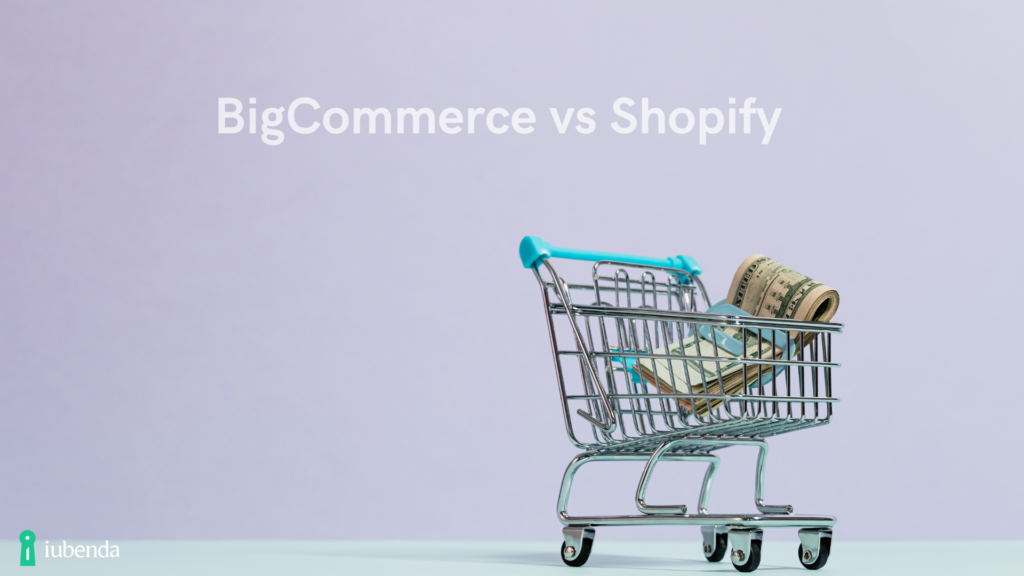Documentation
BigCommerce vs Shopify: Which One is Better for Your Online Business?
Are you ready to start your online store? With so many e-commerce platforms available, it can be difficult to choose the right one for your business! Two popular options are BigCommerce and Shopify – but which one is better?
In this article, we’ll guide you through a comparison of BigCommerce vs Shopify, to help you choose which platform is best for your e-commerce.
Jump to 👇

BigCommerce vs Shopify at a glance
Here below you’ll find a quick comparison of BigCommerce and Shopify. As you’ll see, both platforms are much alike, but there are some differences that could affect your decision.
| Pricing |
Both platforms offer three pricing plans, that range from $29/month to $299/month. They also both offer an Enterprise plan, which is custom-priced. To this monthly subscription, you may need to add transaction fees (for Shopify) and credit card fees (for both Shopify and BigCommerce). |
|
| Ease of use |
If you’re a beginner, Shopify is easier to use than BigCommerce, even though BigCommerce is more powerful. |
|
| Design options |
both platforms offer free and paid themes that you can customize. They also have industry-specific themes. |
|
| Built-in features and third-party integration |
With BigCommerce, you won’t need to download many third-party apps, because it has a wide range of built-in features. Shopify, on the other hand, offers a large app store that allows you to customize your e-commerce as much as possible. |
|
| Customer support |
Both platforms have extensive customer support. |
Choosing an e-commerce platform: in-depth comparison of BigCommerce vs Shopify
Now let’s go over the main features of each platform, to better understand which one is the perfect choice for your particular online store.
📌 Pricing
When choosing an e-commerce platform, pricing is often the first thing people consider.
BigCommerce and Shopify don’t differ too much here: these platforms offer three pricing plans that range from $29/month to $299/month for both BigCommerce and Shopify, with the possibility of saving some money with the annual billing. They also both have a custom-priced plan for big e-commerces, such as Enterprise clients.
However, there are other costs that you should consider and that can affect your choice:
- Transaction fees: a transaction fee is a percentage you pay to the platform for each sale you make. BigCommerce doesn’t have transaction fees on any plan, while Shopify can charge between 2% and 0.5%, depending on your plan. However, BigCommerce has a yearly sales threshold: once the threshold is exceeded, you need to upgrade to the higher plan.
- Credit card fees: credit card fees are paid to the third-party processor you’re using on your online store. Both platforms offer a wide range of third-party payment integrations (Shopify has 100, BigCommerce 65), so it really depends on which one you choose. The cheaper options are recommended directly by Shopify and BigCommerce, such as Shopify Payments or PayPal.
📌 Ease of use
If you’re a beginner, then Shopify is definitely easier to use than BigCommerce. BigCommerce is a powerful platform, but you need to invest some time to understand how to use it best. On the other hand, Shopify also gives you hints and tips that guide you in the setup of your store.
📌 Design
Design is another key factor to consider. A user-friendly interface and a responsive website can really make a difference in your sales.
Both BigCommerce and Shopify have a selection of free and paid themes, that you can align with your brand and customize to make your store more eye-catchy. These ecommerce platforms also have industry-specific themes, that can save you some time with the customization.
📌 Built-in features and third-party integrations
Both platforms have a list of features that you can benefit from, such as:
- shipping integrations;
- customer accounts;
- SEO tools;
- SSL integration;
- sales reports.
However, there are also big differences here.
BigCommerce
If you’re using BigCommerce, you probably won’t need many third-party apps, because the platform has many built-in integrations that can help you in doing what you need to do, without any extra cost.
Shopify
On the other hand, Shopify has fewer built-in features, but a bigger app store (with over 6000 third-party integrations), which allows you to customize your store as you like. While some of these integrations are free, others aren’t, so you should be mindful of that, since it could add up to your monthly plan.
📌 Customer support
Both platforms have excellent customer support: 24/7 phone and live chat support, email support, a help center, forums, tutorials and guides.
Upgrading to a higher plan – such as the Enterprise plan – will also give your requests a priority.
Which one is better: Shopify or BigCommerce?
It really depends. Both Shopify and BigCommerce have many features in common, such as a wide selection of payment gateways, themes and integrations.
If you’re a beginner and you’re just getting started, then Shopify is probably more suitable for you, since it’s easier to use and navigate. But if you’re looking for a powerful and scalable option, BigCommerce may be the best option.
Whether you choose Shopify or BigCommerce, you need to meet legal requirements!
Whether you’re in the US, Europe or another region, you’ll likely need professional terms and conditions for your store (simple templates aren’t enough).
👉 Here’s everything you need to know about terms and conditions for e-commerce stores
Read also
- Best E-commerce Platforms Comparison (2023) + Finding your Perfect Fit
- How do I add my No Return, No Refund Policy to my e-commerce website?
- Abandoned Cart Email Templates
About us
The solution to draft, update and maintain your Terms and Conditions. Optimised for eCommerce, marketplace, SaaS, apps & more.
